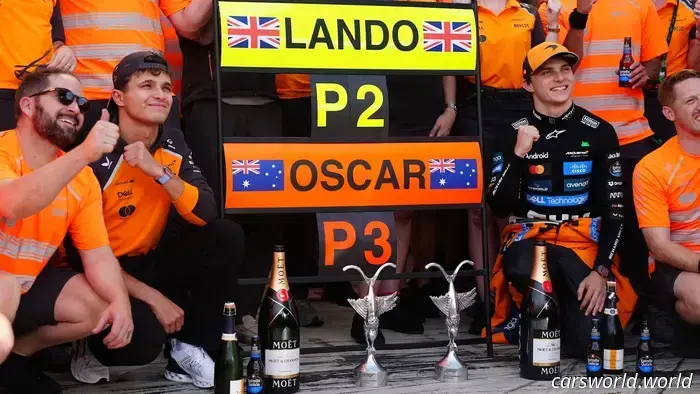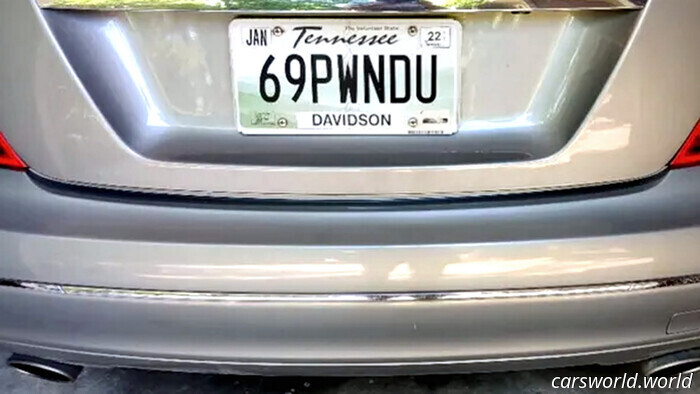
McLaren's Quest for Equity Among Its Eager F1 Drivers Is Chaotic at Best
The latest car news and reviews, without the nonsense.
Our complimentary daily newsletter delivers the important stories straight to you every weekday.
In the realm of sports, Formula 1 stands out as particularly unpredictable. Despite its reliance on calculations, decimals, and metrics, the number of unknown factors often exceeds the known ones. Mid-race rain, suspension malfunctions, or, as happened with Lando Norris on Sunday, a faulty wheel gun lead to numerous "solve for x" scenarios that can't be accurately accounted for.
So, how does one ensure “fair” competition between two teammates vying for their first Drivers’ World Championship? According to McLaren, using team orders through a radio message equalizes the competition.
During the closing laps of yesterday’s Italian Grand Prix, both McLaren drivers entered the pits for new tires to defend against the approaching Ferrari of Charles Leclerc. Norris opted to defer to his teammate, Oscar Piastri, the current championship leader, during the pit stop, which lasted 1.9 seconds. However, a mishap with the left wheel gun resulted in a 5.9-second pit stop for Norris, leaving him behind Piastri. As the Australian driver secured second place in the race, his radio crackled with clear directives: “Oscar, this is reminiscent of Hungary last year. We pitted in this order for team reasons. Please allow Lando to pass; then you are free to race.”
Piastri promptly dropped to third place as Norris moved into second.
McLaren has faced challenges in determining when and how to implement team orders, managing two star drivers competing for one trophy. Last year in Hungary, they allowed Norris to pit first, enabling him to get ahead of Piastri. When the pit wall requested a position swap, Norris resisted until there were two laps remaining in the Grand Prix.
With the lack of distinct No. 1 and No. 2 driver roles, the 2024 F1 season was characterized by “papaya rules,” which often seemed to favor Norris' chances against Max Verstappen. However, both drivers made notable sacrifices. McLaren pledged a different approach for the 2025 season and arrived in Australia with clear expectations for the 24-race calendar ahead. Still, the demands of quick decisions in the heat of competition allowed last year's driver discussions to influence this year: the first race included team orders for Piastri to maintain his position. In Silverstone, Piastri requested a driver swap after incurring a penalty, but the team declined, and Piastri acknowledged that a swap "wouldn't have been fair."
As the championship race sharpens, team directives have become more contentious. Leading into Sunday’s race, Piastri held a 34-point advantage after Norris retired due to a mechanical issue during the Dutch GP.
Norris confirmed that team orders had been discussed prior to the race weekend, asserting it was “the most fair approach.” However, in response to the request for a swap, Piastri remarked over the radio: “We agreed that a slow pit stop is just part of racing, so I don't understand what's changed here. But I'll comply." Verstappen, who ultimately won the race and set a new F1 fastest lap record over the weekend, added his own comments on McLaren's orders: “Ha! Just because he had a slow stop?” Later, Piastri acknowledged there were “valid reasons” for the decision, noting that Norris qualified ahead and performed better throughout the 53-lap race.
While the dual-driver challenge might seem like a straightforward racing ethics dilemma that could be resolved by identifying who delivered a superior drive on Sunday, it delves deeper. The team's discussions about fairness open up potential “what if” scenarios—former F1 champion Jacques Villeneuve cautioned against a potentially dangerous cycle of shifting the balance—while also posing a threat to the spectator experience.
Commentator and ex-F1 driver David Coulthard succinctly captured the situation as team orders unfolded: “As fans, we don’t want to feel as if there’s manipulation beyond the usual racing circumstances.”
When fans watch the race on TV, crowd the stands, or hold up their phones to catch the action, they seek strategy. Yet, they also desire genuine, hard-fought racing. Yielding a position doesn't feel rewarding, whether in Hungary last year or on Sunday at Monza.
The solution to McLaren’s challenges may lie in achieving consistency—something they've done well this year regarding results but struggled with in real-time decision-making over the radio. Or perhaps the lesson from Sunday is to minimize orchestrated racing.
Moving forward, it remains to be seen if the team will initiate requests for swaps via radio or allow both drivers to race freely. McLaren is setting a standard for what fairness entails in the ongoing fight for the F1 constructors’ championship: all is fair in love, war, and the championship battle.
Have a tip? Email us







Другие статьи
 Китайский электровнедорожник Deepal за $17 тыс. в Европе подорожал до $46 тыс. | Carscoops
Все версии Deepal S05 будут оснащаться батареей ёмкостью 68,8 кВт·ч в стандартной комплектации.
Китайский электровнедорожник Deepal за $17 тыс. в Европе подорожал до $46 тыс. | Carscoops
Все версии Deepal S05 будут оснащаться батареей ёмкостью 68,8 кВт·ч в стандартной комплектации.
 «Похоже, это было спроектировано в 1995 году»: босс Mercedes жестко насмехается над интерьером концепта Audi | Carscoops
Горден Вагенер не стеснялся в Мюнхене, высмеивая «салон в стиле 1995 года» Audi и «отвлекающую» компоновку дисплея BMW Neue Klasse.
«Похоже, это было спроектировано в 1995 году»: босс Mercedes жестко насмехается над интерьером концепта Audi | Carscoops
Горден Вагенер не стеснялся в Мюнхене, высмеивая «салон в стиле 1995 года» Audi и «отвлекающую» компоновку дисплея BMW Neue Klasse.
 Стремление McLaren добиться справедливости между своими голодными до побед пилотами Формулы-1 в лучшем случае выглядит неуклюже.
«Это самое справедливое», — сказал Ландо Норрис о спорном решении на воскресном Гран‑при Италии Формулы‑1.
Стремление McLaren добиться справедливости между своими голодными до побед пилотами Формулы-1 в лучшем случае выглядит неуклюже.
«Это самое справедливое», — сказал Ландо Норрис о спорном решении на воскресном Гран‑при Италии Формулы‑1.
 Роботакси, роботы и надежда — план Tesla стать компанией стоимостью 8,5 трлн долларов: TDS
Для того чтобы Элон Маск получил свою следующую выплату, нужна рыночная капитализация в 8,5 триллиона долларов.
Роботакси, роботы и надежда — план Tesla стать компанией стоимостью 8,5 трлн долларов: TDS
Для того чтобы Элон Маск получил свою следующую выплату, нужна рыночная капитализация в 8,5 триллиона долларов.
 Канада замораживает мандат на электромобили, и глава GM не может перестать улыбаться | Carscoops
Глава GM Canada не хочет обязательных требований по продажам электромобилей для автопроизводителей.
Канада замораживает мандат на электромобили, и глава GM не может перестать улыбаться | Carscoops
Глава GM Canada не хочет обязательных требований по продажам электромобилей для автопроизводителей.
 Верховный суд может решить, является ли её персонализированный номерной знак, звучащий непристойно, на самом деле свободой слова | Carscoops
Штат отклонил примерно 1 000 персонализированных номерных знаков с 1998 года.
Верховный суд может решить, является ли её персонализированный номерной знак, звучащий непристойно, на самом деле свободой слова | Carscoops
Штат отклонил примерно 1 000 персонализированных номерных знаков с 1998 года.
McLaren's Quest for Equity Among Its Eager F1 Drivers Is Chaotic at Best
Lando Norris expressed his view on the contentious decision during Sunday's Italian F1 GP, stating, "It's the fairest thing."
